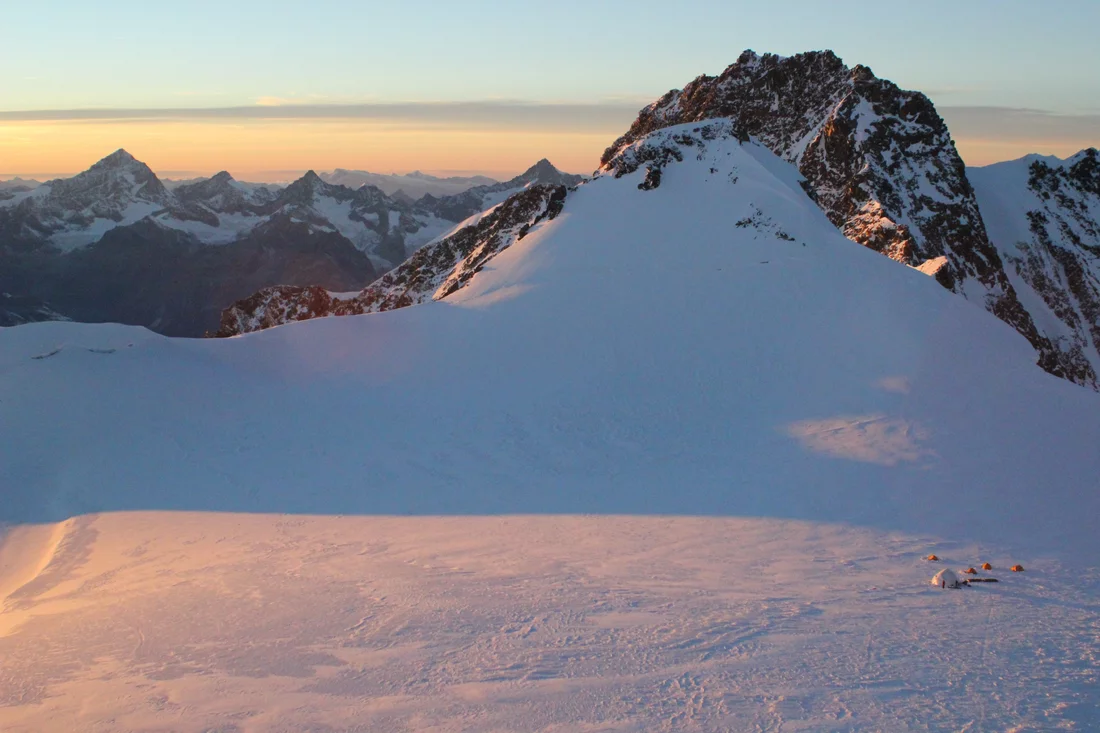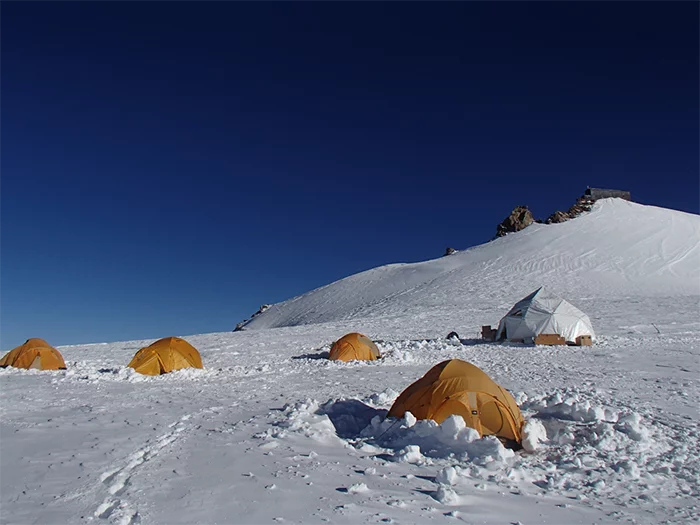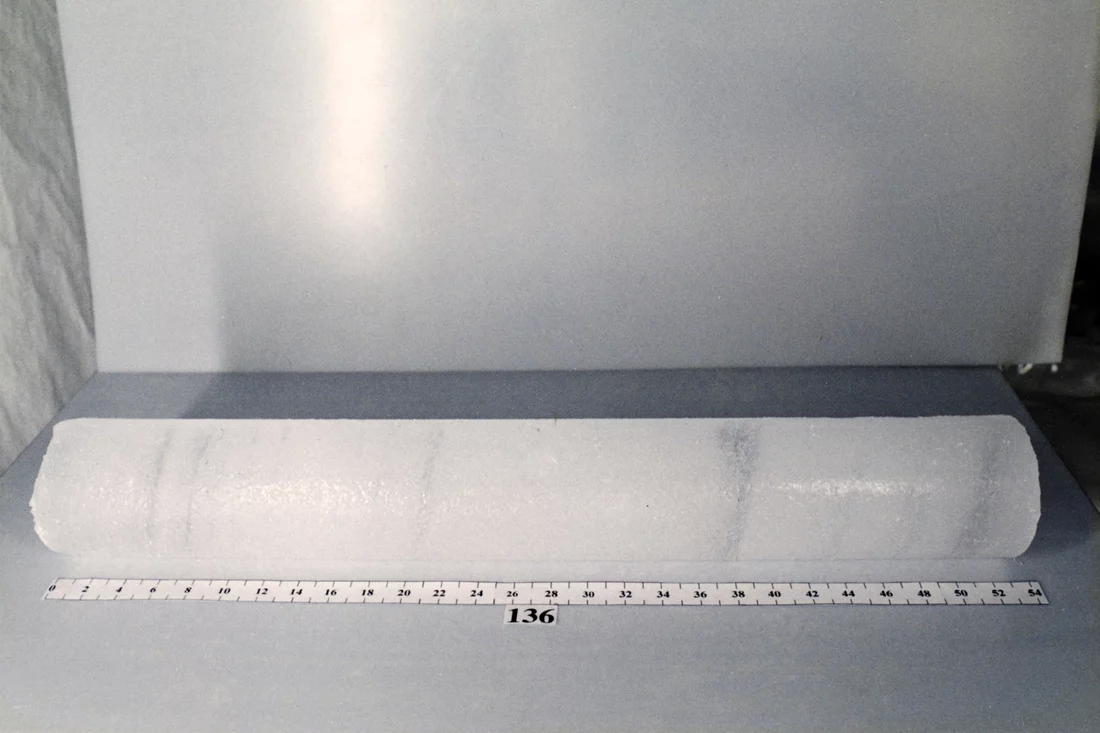The next scientific mission to safeguard the heritage of the Valais Alps has started. After the challenges posed by increased melting on Grand Combin last year, the Italian-Swiss team of the international project Ice Memory now sets out again to save the valuable glacial archive in the Alps. If the team is successful, one of the ice cores will be taken to Antarctica for future generations of scientists.
The Monte Rosa massif holds the most studied and important glacial archive in the Alps. On the glacier saddle Colle Gnifetti, the ice is over 80 meters thick; here, researchers find valuable information on the environment and climate of the last ten thousand years.
But rising temperatures are endangering this scientific and cultural heritage. "When glaciers melt, the information stored in them is lost forever," says PSI post-doc François Burgay of the Laboratory of Environmental Chemistry. The reality of the threat was proven in September 2020, when the glacier plateau below the summits of Grand Combin was in such bad condition that scientists could drill no deeper than 20 metres, where they encountered a layer soaked by seeping meltwater.
For this reason, the Italian-Swiss team wants to extract ice cores from the higher, still ‘cold’ glacier on Monte Rosa as soon as possible for the international project Ice Memory. One of the core samples will be transported to an ‘archive’ of the Earth’s mountain glaciers that will be created in Antarctica.
"The drilling site at Colle Gnifetti lies at a higher altitude than the glacier plateau on Grand Combin. That’s why we are optimistic that the ice and the climate information stored are still well preserved there," says François Burgay, who is taking part in the expedition.
The mission has been organised by the Institute of Polar Sciences ISP of the Italian National Research Council and Ca’ Foscari University of Venice, in collaboration with the Paul Scherrer Institute PSI. It will start 1st of June. The researchers will spend two nights at the Capanna Gnifetti refuge at about 3600 metres, in order to acclimatise. If the weather conditions are favourable, the researchers will fly up to more than 4500 metres a couple of days later, to begin with their work, taking deep core samples.
"Understanding the climate and the environment of the past allows us to foresee changes in the future," says Carlo Barbante, director of the ISP-CNR and professor at Ca’ Foscari University. "Mountain glaciers preserve the memory of the climate and environment of the surrounding territory, but they are retreating inexorably because of global warming, which is threatening the preservation of this invaluable scientific heritage."
The second largest glacier in the Alps
For the duration of the drilling mission, which is expected to last about 10 days, scientists will stay at Capanna Margherita – at 4554 metres the highest mountain refuge in Europe, built on a rocky peak 128 years ago for the purpose of contributing to scientific research in the field of altitude physiology and, more recently, of climatology.
Glacier archives like those at the Monte Rosa massif become increasingly rare in the Alps and this is one of the last chances for scientists to collect ice cores that have not yet been corrupted by climate change and that can offer invaluable information on the history of our climate.
The expedition on Monte Rosa is the second in a series of expeditions financed jointly by the Italian Ministry of Education, University and Research, and the Paul Scherrer Institute.
The science of ice cores
The Ice Memory project aims to preserve quality samples for scientists who, when a few more decades have passed, will probably have new methods and technologies at their disposal for an analysis. "It is a gift of this generation of researchers to future scientists," says François Burgay.
In order to better understand the reaction of the Earth’s climate to natural and man-made emissions, and therefore undertake serious actions to mitigate the climate problems and adapt to it, it is essential to investigate the past, the Ice Core Memory researchers believe. Ice cores help to reconstruct natural climate variability before industrial emissions of for instance of greenhouse gases induced man-made climate change.
Ice cores extracted from Alpine glaciers, such as from Colle Gnifetti at Monte Rosa and from Ortles, have enabled scientists to reconstruct the evolution of climate until 5000 years ago or the impact of industrialization on air pollution levels in Europe.
About Ice Memory
Ice Memory is an international programme that aims to provide, for decades and centuries to come, an archive and data on the history of the Earth’s climate and environment, which is expected to be fundamental to science and to the development of policies for sustainability and human welfare. Ice Memory aspires to create an international confederation of scientific communities and institutions that will develop an archive of ice cores in Antarctica, to preserve information from glaciers that are currently endangered due to global warming. Scientists are convinced that ice contains information that will continue to be valuable even when glaciers have disappeared. Without the intended ice core archive, the resulting knowledge would be lost forever.
For Ice Memory, the expedition to the Monte Rosa massif is the third mission on Alpine glaciers after the one on Mont Blanc in 2016 and to Grand Combin in 2020. Other international expeditions have allowed to secure ice cores of glaciers at Illimani (Bolivia), at Belukha in Siberia and at Elbrus (Russia).
The international Ice Memory Foundation was created at the beginning of this year involving the Paul Scherrer Institute, Université Grenoble Alpes, Ca’ Foscari University of Venice, the French National Research Institute for Sustainable Development (IRD), The French National Centre for Scientific Research (CNRS), the Italian National Research Council (CNR), and the French Polar Institute Paul-Emile Victor (IPEV) as founding members.
Expedition Participants
Theo Jenk (expedition leader, PSI)
Margit Schwikowski (PSI)
François Burgay (PSI)
Sabine Harbeke (ZHdK, PolARTS project)
Jacopo Gabrieli (CNR/Ca’ Foscari)
Fabrizio de Blasi (CNR/Ca’ Foscari)
Andrea Spolaor (CNR/Ca’ Foscari)
Paolo Conz (mountain guide).
Federico Dallo, a Ca’ Foscari researcher, will stay at the base camp in Alagna.
The mission is supported by AKU and Karpos and will feature the collaboration of Einwohnergemeinde Zermatt, the Sektion Naturgefahren Kanton Wallis, Comune di Alagna Valsesia, Alagna’s Mountain Guides, Monterosa srl, Rifugi Monterosa, Monterosa 2000 spa, Camp, ARPA Piemonte, ARPA Valle d'Aosta, Comitato Glaciologico Italiano, Ente di gestione delle aree protette della Valle Sesia, Fondazione Montagna Sicura, and the University of Turin.
Text: Based on a media release by Università Ca' Foscari Venezia with additions from the Paul Scherrer Institute
Contact
Prof. Dr. Margit Schwikowski
Head of Laboratory of Environmental Chemistry
Paul Scherrer Institute, Forschungsstrasse 111, 5232 Villigen PSI, Switzerland
Telephone: +41 56 310 41 10, e-mail: margit.schwikowski@psi.ch [English, German]
Dr. Theo Jenk
Expedition leader, Laboratory of Environmental Chemistry
Paul Scherrer Institute, Forschungsstrasse 111, 5232 Villigen PSI, Switzerland
Telephone: +41 56 310 25 30, e-mail: theo.jenk@psi.ch [German, English]
Dr. François Burgay
Laboratory of Environmental Chemistry
Paul Scherrer Institute, Forschungsstrasse 111, 5232 Villigen PSI, Switzerland
Telephone: +41 56 310 52 48, e-mail: francois.burgay@psi.ch [English, Italian]
Enrico Costa
Media office Università Ca’ Foscari Venezia
Telephone: +39 41 234 80 04, e-mail: enrico.costa@unive.it
Further Information
- Ice Memory Project - Website - https://www.ice-memory.org
- "We were shocked how far advanced the melting is already" – Interview with Margit Schwikowski on the expedition at Grand Combin
- Regular updates on the expedition’s progress on Twitter and on Facebook
Copyright
PSI provides image and/or video material free of charge for media coverage of the content of the above text. Use of this material for other purposes is not permitted. This also includes the transfer of the image and video material into databases as well as sale by third parties.



